SEAT Leon VS Ferrari 296 Coupe – Specs, Efficiency & Price Comparison
Which model is the better choice – the SEAT Leon or the Ferrari 296 Coupe? We compare performance (272 HP vs 830 HP), boot capacity (380 L vs 0 L), efficiency (0.40 L vs 7.40 L), and of course, the price (24500 £ vs 242700 £).
Find out now which car fits your needs better!
The SEAT Leon (Hatchback) is powered by a Petrol, Petrol MHEV, Diesel or Plugin Hybrid engine and comes with a Manuel or Automatic transmission. In comparison, the Ferrari 296 Coupe (Coupe) features a Plugin Hybrid engine and a Automatic gearbox.
When it comes to boot capacity, the SEAT Leon offers 380 L, while the Ferrari 296 Coupe provides 0 L – depending on what matters most to you. If you’re looking for more power, you’ll need to decide whether the 272 HP of the SEAT Leon or the 830 HP of the Ferrari 296 Coupe suits your needs better.
There are also differences in efficiency: 0.40 L vs 7.40 L. In terms of price, the SEAT Leon starts at 24500 £, while the Ferrari 296 Coupe is available from 242700 £.
Compare all the key specs now and find out which model fits your lifestyle best!
SEAT Leon
The SEAT Leon impresses with its dynamic design and sporty edge, making it a standout choice in its class. Its interior is characterised by a modern, driver-focused cockpit that combines functionality with an emphasis on comfort. The car delivers a responsive driving experience, thanks to its advanced engineering and agile handling capabilities.
details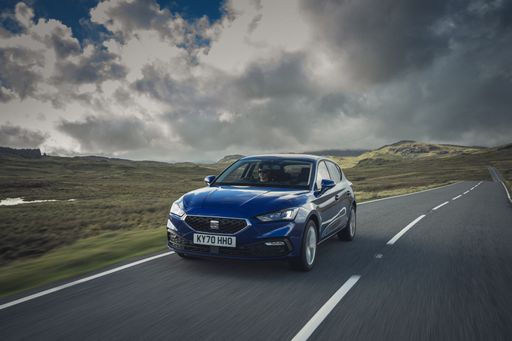 @ seatmedia
@ seatmedia
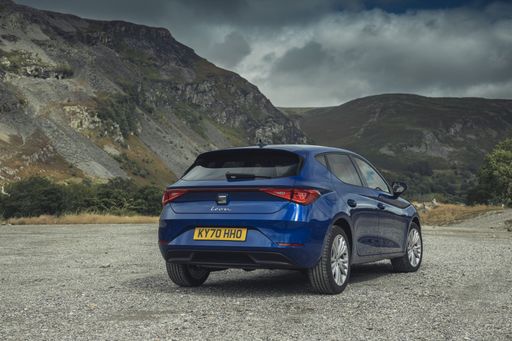 @ seatmedia
@ seatmedia
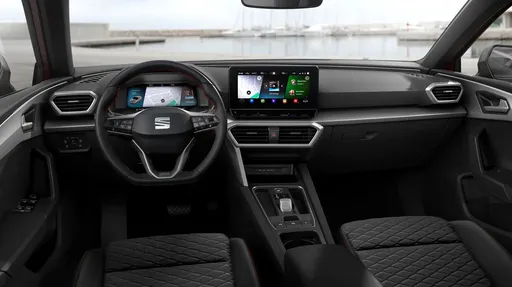 @ seatmedia
@ seatmedia
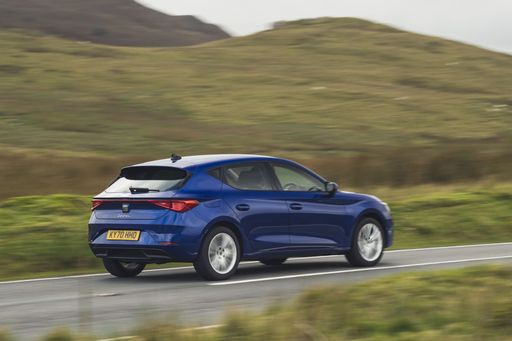 @ seatmedia
@ seatmedia
Ferrari 296 Coupe
The 296 Coupe stands out with its sleek design and exhilarating performance, offering an unmistakable blend of elegance and power. Inside, drivers are greeted with a luxurious interior that combines cutting-edge technology with comfort, ensuring an engaging driving experience. With its refined persona and spirited dynamics, the 296 Coupe exemplifies the perfect balance of sophistication and thrill on the road.
details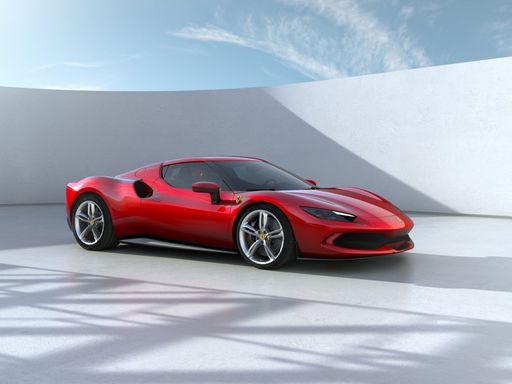 @ Ferrari
@ Ferrari

|

|
|
|
|
Costs and Consumption |
|
|---|---|
|
Price
24500 - 35700 £
|
Price
242700 £
|
|
Consumption L/100km
0.4 - 5.7 L
|
Consumption L/100km
7.40 L
|
|
Consumption kWh/100km
-
|
Consumption kWh/100km
-
|
|
Electric Range
133 km
|
Electric Range
25 km
|
|
Battery Capacity
19.70 kWh
|
Battery Capacity
-
|
|
co2
8 - 129 g/km
|
co2
169 g/km
|
|
Fuel tank capacity
40 - 45 L
|
Fuel tank capacity
65 L
|
Dimensions and Body |
|
|---|---|
|
Body Type
Hatchback
|
Body Type
Coupe
|
|
Seats
5
|
Seats
2
|
|
Doors
5
|
Doors
2
|
|
Curb weight
1344 - 1670 kg
|
Curb weight
1470 kg
|
|
Trunk capacity
270 - 380 L
|
Trunk capacity
0 L
|
|
Length
4368 mm
|
Length
4565 mm
|
|
Width
1799 mm
|
Width
1958 mm
|
|
Height
1442 - 1460 mm
|
Height
1187 mm
|
|
Payload
460 - 521 kg
|
Payload
482 kg
|
Engine and Performance |
|
|---|---|
|
Engine Type
Petrol, Petrol MHEV, Diesel, Plugin Hybrid
|
Engine Type
Plugin Hybrid
|
|
Transmission
Manuel, Automatic
|
Transmission
Automatic
|
|
Transmission Detail
Schaltgetriebe, Automat. Schaltgetriebe (Doppelkupplung)
|
Transmission Detail
Automat. Schaltgetriebe (Doppelkupplung)
|
|
Drive Type
Front-Wheel Drive
|
Drive Type
Rear-Wheel Drive
|
|
Power HP
110 - 272 HP
|
Power HP
830 HP
|
|
Acceleration 0-100km/h
7.7 - 10.5 s
|
Acceleration 0-100km/h
2.90 s
|
|
Max Speed
197 - 220 km/h
|
Max Speed
330 km/h
|
|
Torque
220 - 360 Nm
|
Torque
740 Nm
|
|
Number of Cylinders
4
|
Number of Cylinders
6
|
|
Power kW
85 - 200 kW
|
Power kW
610 kW
|
|
Engine capacity
1498 - 1968 cm3
|
Engine capacity
2992 cm3
|
General |
|
|---|---|
|
Model Year
2024 - 2025
|
Model Year
2022
|
|
CO2 Efficiency Class
D, B
|
CO2 Efficiency Class
F
|
|
Brand
SEAT
|
Brand
Ferrari
|
SEAT Leon
The SEAT Leon: A Blend of Performance and Innovation
The SEAT Leon has firmly established itself as a standout model, blending sleek aesthetics with cutting-edge technology. Known for its versatility and dynamic performance, this hatchback has become a staple choice for drivers seeking style and substance. Join us as we delve into the technical intricacies and innovative features that make the SEAT Leon a formidable contender in its class.
Dynamic Engine Options
The SEAT Leon offers a diverse range of engine choices, catering to various driving preferences. From efficient petrol options with mild-hybrid technology to powerful diesel engines, the Leon provides an impressive power range between 110 to 204 PS. Drivers can also opt for the environmentally friendly plug-in hybrid, featuring a 1.4 e-HYBRID powertrain that boasts a consumption rate as low as 1.1 L/100km and an electric range of up to 63 km.
Advanced Transmission Systems
Optimising driving efficiency, the SEAT Leon is available with both a manual gearbox and an advanced automatic dual-clutch transmission (DSG). The DSG offers seamless gear changes, enhancing the driving experience by providing precise control and improved fuel economy. This versatility allows the Leon to cater to drivers who appreciate the traditional feel of manual shifting and those who prefer the convenience of automatic transmissions.
Intelligent Design and Comfort
The SEAT Leon’s interior is designed with the modern driver in mind. Sporting a spacious cabin accommodating up to five passengers, it provides a balance of comfort and functionality. The boot space ranges from 270 to 380 litres, ensuring ample room for luggage. The Leon's ergonomic layout, coupled with optional advanced features such as ambient lighting and premium upholstery, positions it as a leader in comfort and practicality.
Cutting-edge Technology and Safety
The SEAT Leon is not just about performance; safety features prominently in its design. It is equipped with the latest driver assistance systems, such as adaptive cruise control and lane-keeping assist, ensuring a safer driving experience. The infotainment system offers seamless connectivity, supporting both Android Auto and Apple CarPlay, enabling drivers to stay connected while on the road.
Efficiency and Sustainable Driving
Emphasising sustainability, the SEAT Leon offers CO2 emissions ranging from 25 to 132 g/km, showcasing its commitment to environmental responsibility. Fuel consumption varies between a thrifty 1.1 to 5.8 L/100km, catering to both eco-conscious drivers and those focused on performance. With a competitive price range, the Leon stands out as an economical choice in its segment, balancing initial cost and long-term benefits.
Conclusion
The SEAT Leon continues to set benchmarks with its combination of style, performance, and technological innovation. Its array of engine options, advanced safety features, and luxurious interior make it a compelling choice for modern drivers. Whether you prioritise fuel efficiency, power, or comfort, the SEAT Leon offers a tailored driving experience unmatched in its class.
Ferrari 296 Coupe
Unveiling the Ferrari 296 Coupe: A Masterpiece of Hybrid Engineering
The automotive world has continually witnessed innovations that push the boundaries of performance, efficiency, and design. The Ferrari 296 Coupe is a paragon of this evolution, merging traditional Ferrari excellence with cutting-edge hybrid technology. With its striking aesthetics and formidable performance capabilities, the 296 Coupe is not just a car but an experience that epitomizes the future of high-performance automobiles.
Powertrain and Performance: A New Era
Under the hood, the Ferrari 296 Coupe boasts a remarkable 3.0-liter V6 engine paired with a plug-in hybrid system. This ingenious combination yields an astonishing 830 horsepower, allowing the vehicle to accelerate from 0 to 100 km/h in just 2.9 seconds. The hybrid system is not merely for show; it enables the coupe to operate in electric mode for short distances, with an electric range of 25 km. This versatility means you can silently navigate city streets while preserving the raw power needed for exhilarating drives on the open road.
Transmission and Driving Dynamics
The 296 Coupe features a sophisticated automatic transmission with dual-clutch technology, enhancing both performance and driving pleasure. This innovation ensures lightning-fast gear shifts, enabling the driver to exploit its impressive 740 Nm of torque effectively. The rear-wheel-drive configuration adds to the car’s performance pedigree, delivering a dynamic driving experience that is quintessentially Ferrari.
Design and Aesthetic Appeal
Visually, the Ferrari 296 Coupe exemplifies the brand's commitment to aesthetics and aerodynamics. With a length of 4565 mm and a width of 1958 mm, the coupe presents a sporty silhouette that is both sleek and muscular. The low stance, aggressive lines, and distinctive front fascia all work in harmony to create a striking presence on the road. The design is further complimented by functional aerodynamic features that enhance stability and performance at high speeds, with a top speed capped at an impressive 330 km/h.
Interior: Luxurious Comfort Meets Advanced Technology
Inside, the Ferrari 296 Coupe is equally impressive, designed for two occupants who seek comfort without compromising performance. Luxurious materials, meticulous craftsmanship, and innovative technology come together to create an immersive driving experience. The cabin features state-of-the-art infotainment systems, driver-centric controls, and a digital display that keeps crucial performance information at the driver’s fingertips.
Environmental Considerations
In an era where sustainability is paramount, the Ferrari 296 Coupe addresses these concerns head-on. The hybrid engine not only boasts impressive power but also optimizes fuel efficiency, recording a consumption of 7.4 liters per 100 km. With CO2 emissions rated at 169 g/km, it falls within efficiency class F, showcasing Ferrari's commitment to reducing the environmental impact of high-performance vehicles.
Final Thoughts: The Future of Ferrari
The Ferrari 296 Coupe is more than just a vehicle; it is a statement of intent from the legendary brand. It captures the essence of what makes Ferrari iconic – breathtaking performance, innovative technology, and timeless design – while steering the brand toward a sustainable future. As the automotive landscape continues to transform, the 296 Coupe stands out as a beacon of what high-performance hybrid sports cars can achieve.
The prices and data displayed are estimates based on German list prices and may vary by country. This information is not legally binding.
